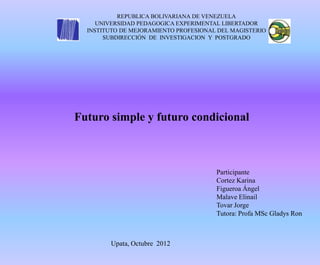
Futuro Simple y Condicional Ingles
- 1. REPUBLICA BOLIVARIANA DE VENEZUELA UNIVERSIDAD PEDAGOGICA EXPERIMENTAL LIBERTADOR INSTITUTO DE MEJORAMIENTO PROFESIONAL DEL MAGISTERIO SUBDIRECCIÓN DE INVESTIGACION Y POSTGRADO Futuro simple y futuro condicional Participante Cortez Karina Figueroa Ángel Malave Elinail Tovar Jorge Tutora: Profa MSc Gladys Ron Upata, Octubre 2012
- 2. FUTURO SIMPLE. Es un tiempo verbal que se utiliza para describir acciones que se van a desarrollar en el futuro. Por ejemplo: I will study the lesson…. •Se puede utilizar con o sin mencionar el tiempo en el que se desarrollará la acción: Ejemplo I will listen to music I will listen to music tomorrow……… •Se forma con el auxiliar "will" seguido del infinitivo del verbo principal: She will buy a car……. We will go to the cinema La forma contraída del auxiliar "will", que se representa por " 'll ": She`ll buy a car……………. •La forma negativa se construye situando la partícula de negación "not" entre el auxiliar y el verbo principal. Se suele utilizar la forma contraída de "will not" que se representa por "won't" : I won`t (will not) play tennis…………..
- 3. •La forma interrogativa Will you play tennis? ………………. •Si la interrogación es negativa, ésta se forma con el auxiliar "will", seguido del sujeto, de la negación "not" y del verbo principal; pero si se utiliza la contracción "won't", ésta se coloca al comienzo de la oración: Won`t you dance whit me?................................... La Estructura Básica de las respuestas cortas del futuro simple: Afirmativo: Yes, I will… Negativo: No, I won`t… (will not)
- 4. PARA QUÉ SE UTILIZA EL FUTURO SIMPLE: 1.-Para hablar sobre decisiones que hacemos espontáneamente en el momento de hablar 2. "Will you help me?" (¿Me ayudas?) "Will you read this?" (¿Lees esto?) 3."I'll help you." ("Te ayudo.") "I'll open the door." ("Te abro la puerta.") 4"I think it'll probably rain this evening so bring your umbrella." (Creo que probablemente lloverá esta tarde así que trae tu paraguas.) 5"I'll pay you back the 100 bsf I owe you tomorrow." (Te devolveré los 100 bsf que te debo mañana.) "I'll hit you." (Te golpearé)
- 5. FUTURO CONDICIONAL. • Existen tres tipos de oraciones condicionales, está en futuro, presente y en pasado, la forma condicional es la más sencilla y fácil se utiliza el verbo luego de “ If ”ejemplos: If I need help, I`ll call you. •El Condicional puede ser definido como la forma verbal que nos indica aquella acción, estado o existencia que en el pasado estaba en futuro y a la que nos referimos en el presente; nos indica también aquella acción, estado o existencia que no es posible convertir en hecho sin antes eliminar determinada condición - expresada o no- que impide tal cosa. •El tiempo condicional se construye con "would" más el infinitivo del verbo principal (aunque con la primera persona del singular y del plural también se puede utilizar "should"): You would learn spanish…………………. Tu estudiaras español. We Would go to the beach……………… Nosotros iriamos a la playa. •El Condicional se resuelve mediante dos formas verbales auxiliares que asimismo son la forma en pasado y condicional de shall y will. Son éstas: SHOULD: Nos sirve para la primera persona del singular y del plural. WOULD: Nos sirve para la segunda y tercera personas del singular y del plural.
- 6. •La forma negativa se construye interponiendo la negación "not" entre la forma auxiliar "would" y el verbo principal. Se puede utilizar también las contracción "wouldn't" (y también "shouldn't" con la primera persona del singular y plural): You would not say that……………………….. Tú no dirías eso. We Shouldn`t buy that house………………. Nosotros no compraríamos esa casa. • La forma interrogativa negativa "wouldn´t" (o "shouldn't), en cuyo caso irían al comienzo de la oración: Would you not go to the party?.................................... ¿No irías a la fiesta? Wouldn`t you go to the party?....................................... Ejemplos: Futuro. Condicional. I shall go (Iré)…………………………………………………. I should go (iría) You will go (Irás)…………………………………………….You would go(irías) He will go (Irá)………………………………………………. He would go(iría) We shall go (Iremos)…………………………………….We should go( iríamos) You will go (Iréis)………………………………………… You would go (iríais) They will go (Irán)………………………………………..They would go( irían)
- 7. Suj Verbo tobe going to verbo I am going to eat something. Voy a comer algo. You are going to talk to somebody. Vas a hablar con alguien. He is going to listen to something. Va a escuchar algo. (él) She is going to read something. Va a leer algo. (ella) It is going to go somewhere. Va a ir a algún sitio. We are going to look at something. Vamos a mirar algo. You are going to wear something. Vais a poneros algo. They are going to sit somewhere. Van a sentarse en algún sitio.
- 8. suj aux not going to verbo I am not going to eat something. No voy a comer algo. You are not going to talk to somebody. No vas a hablar con alguien. He is not going to listen to something. No va a escuchar algo. (él) She is not going to read something. No va a leer algo. (ella) It is not going to go somewhere. No va a ir a algún sitio. We are not going to look at something. No vamos a mirar algo. You are not going to wear something. No vais a poneros algo. They are not going to sit somewhere. No van a sentarse en algún sitio
- 9. THANK YOU….
